- Home
- Call Center
- Your 2024 Guide to Call Center Quality Assurance
Your 2024 Guide to Call Center Quality Assurance
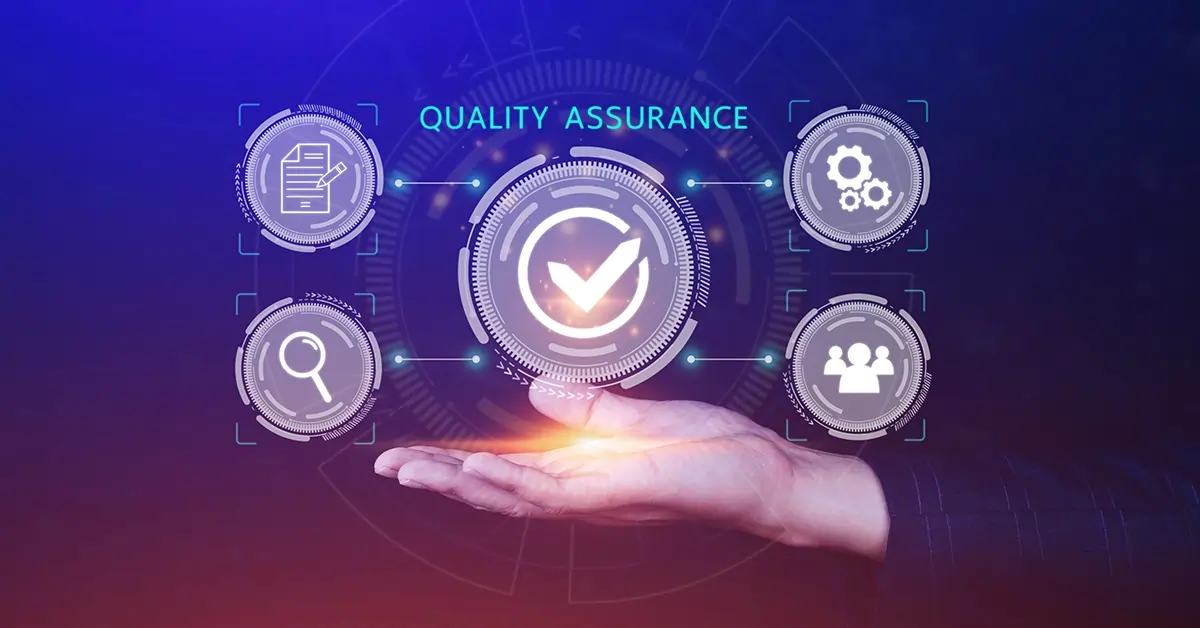
Are you struggling to maintain high service quality even when your agents follow the script flawlessly?
It might be the call center quality assurance.
Ensuring consistent, high-quality service in a call center is a common challenge for many. The root of the problem often lies in the inability to understand service delivery steps.
This is where call center quality assurance (QA) is helpful.
QA provides a structured approach to evaluate agent performance and customer interactions, helping to identify shortcomings and improve service quality.
This article will discuss call center quality assurance, its benefits, tools, and how you can improve the quality of your call center.
Table of Contents:
- What is Call Center Quality Assurance (QA)?
- Why is Quality Assurance Essential in a Call Center?
- Methods of a Call Center QA Process
- Top Software for Call Center Quality Assurance
- How can you Improve your Call Center QA?
What is Call Center Quality Assurance (QA)?
Call center quality assurance (QA) is a comprehensive process that monitors and evaluates all aspects of call center operations to make sure they meet and exceed customer expectations. This includes agent performance, quality of service, and adherence to compliance standards.
QA involves using tools such as call monitoring, scoring, and analytics software to evaluate the effectiveness of customer interactions.
By analyzing these interactions, QA identifies areas of improvement in communications, processes, and overall service.
Why is Quality Assurance Essential in a Call Center?
1. Improves Customer Satisfaction
Quality assurance ensures that you provide consistent and high-quality service, which improves customer satisfaction. By monitoring conversations, you identify areas of improvement and ensure that customers get the best possible experience.
2. Improves Agent Performance
Conducting regular QA assessments helps identify strengths and weaknesses in an agent’s performance. Providing targeted feedback and training based on these assessments improves agent skills or confidence.
3. Ensures Compliance with Standards
QA processes help ensure that agents follow company policies, industry regulations, and legal requirements. This reduces the legal issues, and damage to your company’s reputation is avoided.
4. Increases Operational Efficiency
By systematically evaluating and optimizing call center operations and identifying areas for improvement, QA helps streamline processes and reduce errors. This increases efficiency, reduces operational costs, and improves overall customer experience.
Methods of Call Center QA
Implementing adequate quality assurance (QA) methods is critical to maintaining high customer service standards in your call center. There are two main methods of call center quality assurance:
- Manual Quality Assurance
- Automate Quality Assurance
Manual Quality Assurance
Manual QA involves human supervisors or QA analysts who evaluate agent performance by listening to calls, using scorecards, conducting surveys, and providing coaching.
A typical manual call center QA process includes the following tools:
1. Call Monitoring
Quality assurance supervisors, experts, or analysts randomly select interactions between agents and customers for monitoring.
These specialists evaluate agents’ performance based on predefined criteria such as communication skills, script adherence, call handling procedures, and overall customer interaction quality.
2. Scoreboards
Scorecards help objectively evaluate different aspects of a call, such as greeting, compliance, problem resolution, and active listening and closing.
Scoreboards typically evaluate five key areas: verification of caller authentication, handling calls for immediate action, adherence to call flow scripts, agent conduct, and proper call documentation.
By evaluating these key areas, scorecards provide a structured framework to assess an agent’s performance and identify areas for improvement.
3. Coaching Sessions
Based on call monitoring and scorecard results, QA specialists provide feedback and coaching to agents.
This includes regular one-on-one sessions between agents and supervisors to review performance, discuss QA feedback, and provide guidance on improving specific skills or addressing weaknesses.
4. Quality Assurance Metrics
You track metrics such as average handling time (AHT), first call resolution (FCR), and customer satisfaction score (CSAT) to measure overall quality and performance. Analyzing these metrics helps identify areas for improvement.
5. Quality Assurance Reporting
QA teams prepare regular reports summarizing call quality trends and agent performance and identifying areas for improvement.
These reports are shared with management, which helps develop training programs and implement process improvements. Call center QA always helps ensure consistent, high-quality service that meets customer and business expectations.
Automated Quality Assurance
In addition to manual methods, call centers leverage automated QA methods. Automated QA uses a combination of technology and artificial intelligence (AI) to analyze call data, monitor in real time, and perform consistent and efficient evaluations based on predefined criteria.
Automated QA process includes the following tools:
1. Real-time call monitoring software
This software allows supervisors to monitor live calls. They also give agents real-time feedback on their performance.
2. Speech analytics software
This software analyzes recorded calls for specific keywords, phrases, and sentiments. This method helps identify customer problems and opportunities for quality improvement.
3. Automated scoring tools
These tools automatically score calls based on predefined criteria, reducing the manual efforts required and providing consistent and objective evaluation.
4. AI-powered insights
Artificial intelligence and machine learning algorithms analyze vast amounts of call data to:
- Uncover patterns
- Predict customer behavior
- Suggest actionable insights to improve service quality
Top Software for Call Center Quality Assurance
1. Knowmax
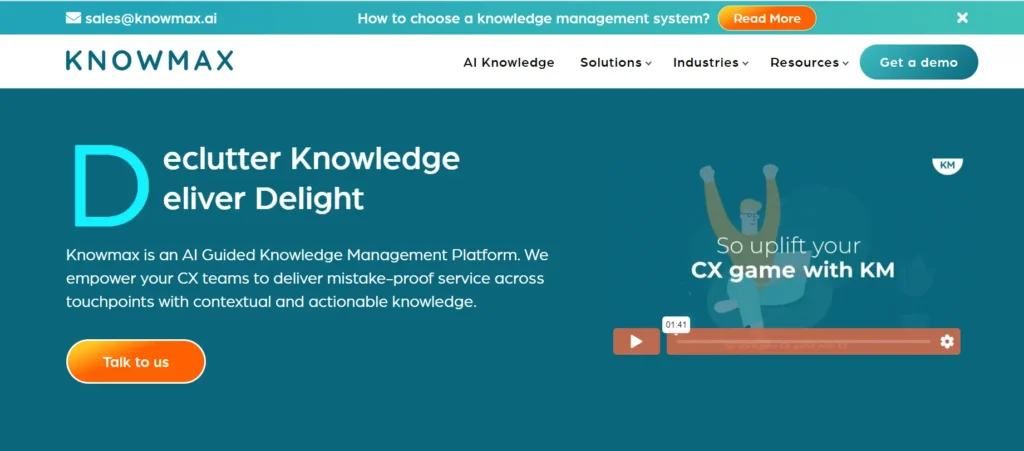
Knowmax is a guided knowledge management platform that empowers your agents with the necessary resources required for excellent customer service.
It allows you to create, store, and manage information in different formats, such as decision trees, support articles, and FAQs. This makes accessing the right information flawless.
Key Features:
- Single source of truth for your organizational knowledge
- Dynamic decision trees, picture guides, and other content modules
- AI search
- Advanced Analytics and Reporting
2. Talkdesk
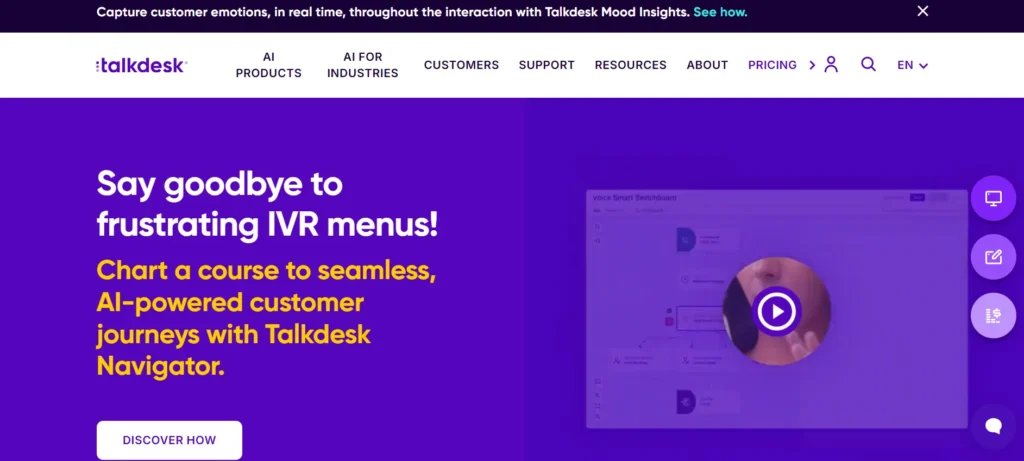
Talkdesk is a cloud-based solution that offers features designed to improve call center quality assurance (QA).
It provides omnichannel support, AI-powered analytics, and recording functionality to empower supervisors and enhance customer interactions.
Key Features:
- Omnichannel quality monitoring
- AI-powered analytics
- Call recording and transcription
- Workforce management
- Customizable QA reports
3. Five9
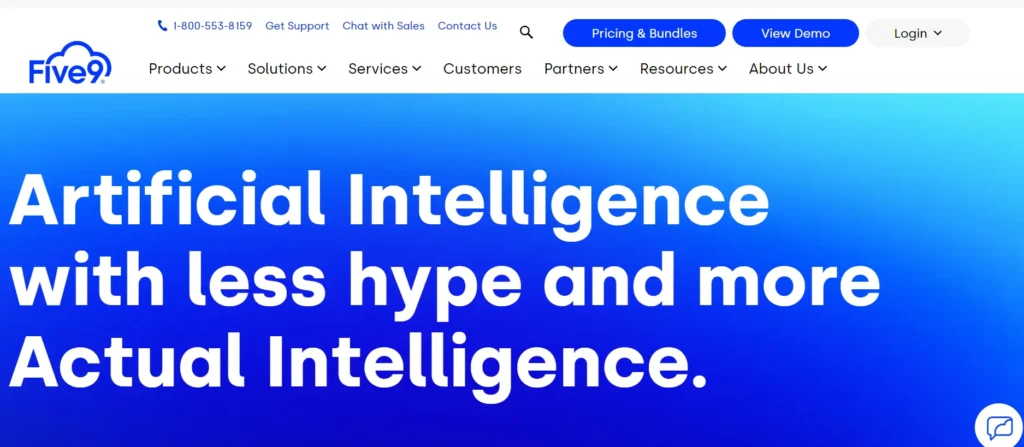
Five9 is a cloud-based contact center platform that provides supervisors with real-time monitoring, call recording, and AI-powered analytics to enhance service quality.
Key Features:
- Real-time monitoring
- Call recording and transcription
- Quality management
- Workforce optimization
- AI and machine learning analytics
4. Calabrio One
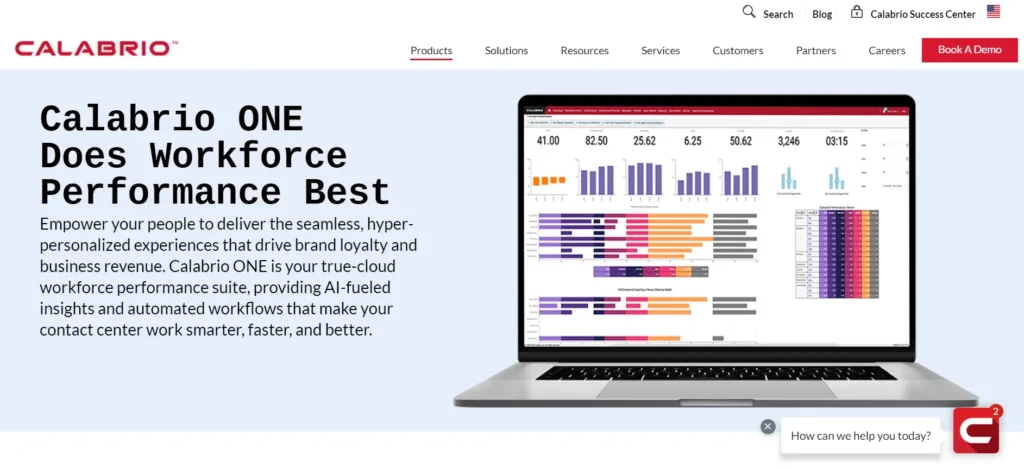
Calabrio One is an intuitive suite of tools for workforce optimization and quality management. It is designed to improve agent performance and customer satisfaction.
Furthermore, Calabrio provides agents instant feedback through rich dashboards, helping them discuss best practices and set benchmarks and agent contests to promote healthy competition.
Key Features:
- Call recording
- Speech and text analytics
- Performance dashboard
5. Observe.AI
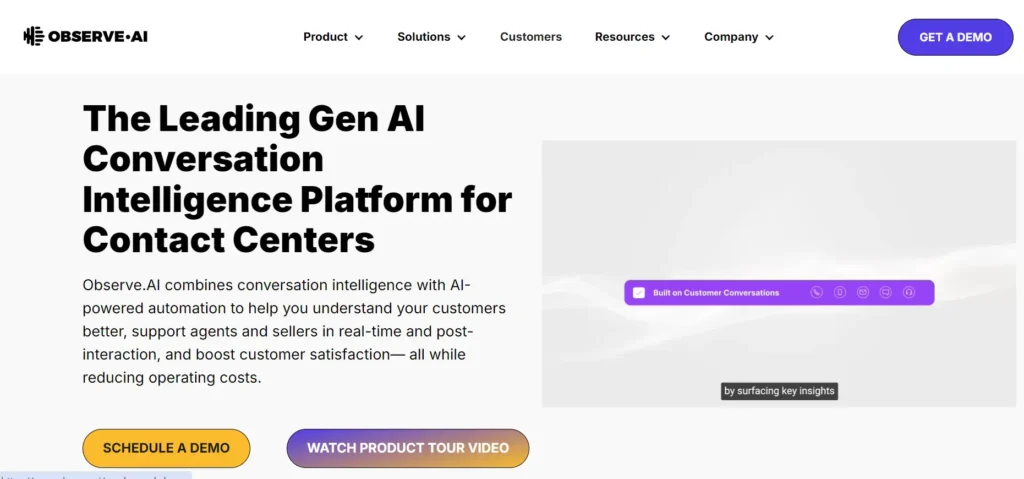
Observe.AI streamlines call center quality assurance with the latest AI technology. It provides real-time call transcription, automated QA scoring, and AI-powered insights to empower supervisors and improve agent performance.
Key Features
- AI-powered insights
- Agent coaching recommendations
- Performance tracking
How can You Improve Your Call Center QA?
Improving call center quality assurance (QA) involves implementing strategies. Here are several ways to improve your call center QA:
1. Use Advanced QA Tools
Select tools that are appropriate for your call center. You can use AI-powered solutions or comprehensive platforms.
Ensure the tools you choose provide real-time analytics, automated scoring, and AI-powered insights to streamline the QA process.
2. Provide Continuous Training and Feedback
Conduct regular training sessions to help agents become informed and skilled with up-to-date knowledge and best practices. Also, provide real-time feedback to help agents improve performance immediately.
3. Monitor and Analyze Conversations
Record and review calls and interactions between agents and customers. Reviewing call recordings regularly helps you identify patterns and areas for improvement.
It is also advisable to use AI-powered speech analysis to gain deeper insights into customer interactions and identify common issues or opportunities.
4. Attend Calibration Sessions
Ensure all QA assessors are on the same page by conducting regular calibration sessions to discuss and align scoring standards. Encourage collaboration to facilitate discussions and reviews, ensuring consistent and fair assessments.
5. Incorporate Customer Feedback
Use post-call surveys and feedback tools to gather customer insights and incorporate them into your QA process.
Act on customer feedback, promptly address their issues, and use the insights to refine your QA criteria and training programs.
6. Leverage Performance Metrics
Monitor metrics such as first call resolution (FCR), average handle time (AHT), and customer satisfaction (CSAT) to assess performance.
Use analytics tools to identify trends and areas that need attention, allowing you to make data-driven decisions to enhance QA.
The Bottom Line
By implementing the above strategies and using advanced QA tools, you can significantly improve the quality assurance process in your call center.
Remember, a well-organized call center is the foundation for building strong customer relationships and driving success.
Related Post
Copyright © gocustomerexperience.com. All Rights Reserved.




